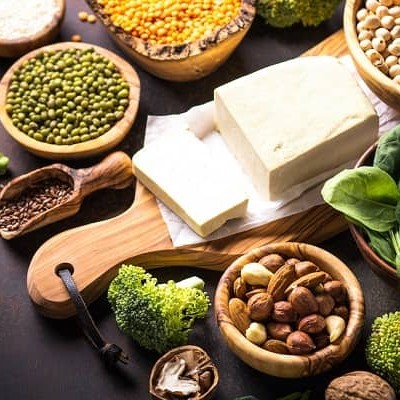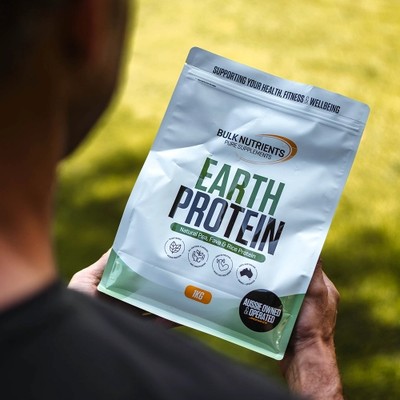The Ultimate Guide to Pea Protein

Welcome to Bulk Nutrients’ Ultimate Guide to Pea Protein!
Pea protein is a nutritional powerhouse known for its high protein content and minimal carbs. It’s perfect for vegans, those with food sensitivities, or anyone looking to lower their dairy intake and enhance their health.
Throughout this guide, we'll provide insights, tips, and inspiration on unleashing pea protein's potential. We'll answer questions, share recipes, and explain why pea protein is a top choice for muscle growth, recovery, and overall well-being.
Whether you're an athlete, a health-conscious individual, or simply curious about plant-based supplements, let's explore the benefits of pea protein together!
What is Pea Protein?
Pea protein is a natural vegetable protein derived from peas. What sets it apart from other plant-based proteins, is its remarkable versatility and nutritional profile.
Pea protein is renowned for its balanced amino acid spread and high protein concentration, making it an excellent choice for vegans and vegetarians who may struggle to meet their protein needs through plant-based diets alone.
For example, Bulk Nutrients’ Pea Protein Isolate boasts a high protein concentration, averaging 85%, and keeps carbohydrate levels minimal, at less than 5.5%. It also has high levels of branched-chain and essential amino acids, specifically alanine, arginine, glutamic acid, and tyrosine.
In fact, its amino acid spectrum closely resembles that of whey protein and breast milk, making it the perfect dairy alternative for individuals focused on muscle growth and recovery.
Unlike some protein sources that may contain GMOs or allergens like dairy and gluten, our pea protein is clean and all-natural. It’s completely free from GMOs, dairy, lactose, soy and gluten. It’s a game-changer for anyone with dietary restrictions or those looking to reduce their dairy intake.

How is Pea Protein Made?
Bulk Nutrients' Pea Protein is exclusively derived from 100% non-GMO yellow split peas, prioritising the highest standards of quality and safety.
The journey begins by removing the outer shells of these peas, followed by a gentle grinding process known as 'milling.'
To further refine the peas, water is added to the mixture, effectively eliminating fibre and starch.
The mixture is then gently heated and treated through a process called precipitation, where the protein is extracted, resulting in a purified powder.
We sweeten this purified powder with the highest grade of Monk Fruit and Stevia – our all-natural sweetener blend. To finish off our chocolate and vanilla blends, we add 100% natural flavours as the final ingredient.
These ingredients guarantee that our pea protein stays all-natural, free from any artificial additives, flavours and sweeteners.
Nutritional Benefits of Pea Protein
A Protein Powerhouse
Pea protein averages at approximately 85% protein, rivalling other protein sources like whey. This high concentration of essential amino acids, including alanine, arginine, glutamic acid, and tyrosine, makes it ideal for muscle growth and overall health.
Low Carb, High Protein
With less than 5.5% carbohydrates, pea protein is an excellent choice for those on low-carb diets or anyone looking to maintain stable blood sugar levels while enjoying the benefits of protein.
A Clean and Natural Choice
Pea protein is derived from 100% GMO-free yellow peas, and uses all-natural flavours and sweeteners, ensuring you're getting a pure, plant-based protein source.
Suitable for Sensitive Stomachs
Free from common allergens like lactose, soy and gluten, pea protein is an ideal choice for individuals with food intolerances.

Pea Protein for Fitness and Weight Management
Whether your goal is muscle gain, weight management, weight loss or general health, pea protein is adaptable and can aid your journey.
Pea protein is a remarkable plant-based choice for athletes, fitness enthusiasts and anyone looking to develop muscle. Its rich amino acid profile, similar to whey protein, promotes muscle growth, development and efficient recovery.
What sets it apart from other proteins is its impressive digestibility rate of 94%, which helps reduce digestive stress and minimize protein wastage.
Weight Management and Appetite Control
Pea protein plays a valuable role in weight management and curbing those snack cravings. Its ability to induce a sense of fullness and satiety assists in calorie control, helping individuals better manage their weight.
In a 2011 study investigating its effect on appetite, pea protein's thick consistency proved to be satisfying, making it an effective aid in curbing between-meal cravings.
Additionally, the complex carbohydrates in pea protein have a minimal impact on blood sugar levels, making it an excellent choice for those seeking to maintain a healthy weight and balanced diet.
Weight Loss Support
Just like its role in weight management, pea protein has benefits for those looking to lose weight, and it can be a valuable ally in your weight loss journey.
Its unique properties, including a thick consistency that promotes a sense of fullness, make it an effective tool for controlling calorie intake. By helping you feel satisfied, pea protein can reduce the temptation to overeat or indulge in unhealthy, calorie-dense snacks.
Incorporating pea protein into your diet can support your weight loss goals by assisting in calorie control, making it a valuable ally on your weight loss journey.
Versatility in Fitness Nutrition
Pea protein's neutral flavour makes it a versatile addition to fitness nutrition. Its mild taste allows it to seamlessly blend into post-workout smoothies, providing a convenient and effective source of muscle-repairing protein.
Pea protein is an excellent choice for crafting high-protein, low-calorie snacks, offering fitness enthusiasts a satisfying and nutritious option to support their dietary goals.
Whether you're looking to refuel after a strenuous workout or maintain a protein-rich diet while managing your caloric intake, pea protein's adaptability makes it a valuable asset in your fitness journey.
Incorporating Pea Protein into Your Diet
Variety in Every Meal
Pea protein's adaptability makes it a versatile addition to your daily meals. Pea protein can be seamlessly integrated if you're a fan of smoothies, shakes, baked goods, or savoury dishes.
Its slightly nutty, earthy flavour pairs well with various ingredients, allowing you to enjoy protein-packed meals without compromising on taste.
Smoothies and Shakes
One of the easiest ways to enjoy pea protein is by blending it into your favourite smoothies and shakes.
Mix it with fruits, vegetables, nut butter, and your choice of liquid for a high-protein, nutrient-packed beverage.
It's an ideal post-workout treat or a quick and healthy breakfast option!
Baked Goods
Elevate your baked goods by incorporating pea protein into recipes for muffins, pancakes, and protein bars. The high protein content adds a nutritional boost to your favourite treats, making them a guilt-free pleasure.
Savoury Dishes
There’s no need to limit pea protein to sweet dishes - it can also enhance savoury recipes like soups, stews, and veggie burgers.
Use it to add extra protein to your meals and create your own plant-based culinary masterpieces!
Explore Our Recipes
If you're looking for inspiration, we've got you covered. Explore our collection of pea protein recipes that showcase the incredible ways you can incorporate this natural protein source into your diet. From hearty breakfast options to satisfying dinners and high-protein snacks, you're sure to find a recipe you’ll love.
Bulk Nutrients’ Pea Protein Recipes

Pea Protein Frequently Asked Questions (FAQs)
Is it OK to Have Pea Protein Every Day?
Yes, pea protein can be consumed daily as part of a balanced diet. It's an excellent way to consistently meet your protein needs, especially if you follow a plant-based diet.
Is Pea Protein Easy on the Kidneys?
Yes, pea protein is generally considered safe for the kidneys. It doesn't contain excessive amounts of protein that may strain kidney function, making it a suitable choice for most individuals.
Does Pea Protein Build Muscle as Well as Whey Protein?
Yes, pea protein can effectively support muscle growth and recovery, similar to whey protein. Its amino acid profile is comparable to whey, making it an excellent plant-based alternative.
One of its remarkable features is its high levels of Arginine, exceeding those found in whey protein, which makes it an excellent choice for individuals prioritizing muscle development.
Additionally, pea protein has an impressive digestibility rate of 94%, meaning it places less stress on the stomach compared to whey protein. This reduces the risk of malabsorption and protein wastage and makes it ideal for individuals with sensitive stomachs.
Can Pea Protein Replace Meat?
Pea protein can be a valuable meat alternative, especially for vegans and vegetarians. It provides essential amino acids and protein without the saturated fat and cholesterol often found in meat.
How Much is a Serving of Pea Protein?
A typical dose of our Pea Protein Isolate is one flat scoop (30g) with 250 - 300ml of water.
Can Pea Protein Powder Cause Digestive Discomfort?
Some individuals may experience digestive discomfort when consuming pea protein, such as bloating, constipation, diarrhea, or gas.
To minimize these issues, start with a smaller serving size and gradually increase it as your body adjusts. Also ensure proper hydration to support healthy digestion.
What are the Pros of Pea Protein Powder?
- High-Quality Plant-Based Protein: Pea protein stands out as a top-tier plant-based protein source, offering an excellent protein concentration that supports muscle growth and recovery.
- All-Natural Ingredients: Pea protein is derived from 100% non-GMO yellow peas, ensuring an unadulterated and wholesome protein source.
- Vegan and Allergen-Friendly: It's a vegan-friendly protein option and an ideal choice for individuals with dietary restrictions, as it is dairy-free, lactose-free, and gluten-friendly.
- Easy on Digestion: Pea protein's digestibility rate of 94% makes it gentle on the stomach and minimizes the risk of malabsorption.
- Balanced Nutritional Profile: With its well-balanced amino acid spread, including essential and branched-chain amino acids, pea protein offers comprehensive nutritional benefits.
- Supports Weight Management: Pea protein can promote feelings of fullness and satiety, aiding in calorie control and supporting weight management goals.
What are the Cons of Pea Protein Powder?
- Incomplete Amino Acid Profile: Pea protein lacks some essential amino acids, making it necessary to complement it with other protein sources for a complete amino acid profile.
- Earthy Taste and Texture: Some individuals may find the earthy taste and slightly gritty texture of pea protein less appealing than other protein sources.
- Potential Digestive Discomfort: While easily digestible for most, some individuals may experience mild digestive discomfort, such as bloating or gas, when consuming pea protein.
- Not Suitable for Pea Allergies: Individuals with pea allergies should avoid pea protein due to the risk of allergic reactions.
Why Choose Pea Protein?
Pea protein stands out as a remarkable choice in the world of plant-based nutrition for a multitude of reasons. First and foremost, it offers a top-tier source of high-quality, all-natural plant-based protein.
Derived from 100% non-GMO yellow peas, it remains pure and free from artificial additives, flavours, or sweeteners. Pea Protein is also free from common allergens such as gluten, lactose, dairy and soy, making it suitable for a variety of dietary preferences.
One of pea protein's most impressive features is its ability to support both muscle growth and recovery.
Its amino acid profile closely mirrors that of whey protein, making it an excellent plant-based alternative for athletes, fitness enthusiasts, and those focused on muscle development.
Its elevated levels of arginine further enhance its muscle-building potential, surpassing those found in traditional sources like whey protein.

Summing up Pea Protein
For those on a journey towards better weight management or weight loss, pea protein can play a pivotal role. It promotes feelings of fullness and satiety, which can assist in calorie control and reduce the temptation to snack on unhealthy, calorie-dense options. Its complex carbohydrates have a minimal impact on blood sugar levels, further contributing to stable energy levels.
Pea protein also makes a great addition to various recipes. Whether you're blending it into post-workout smoothies, enhancing baked goods, or incorporating it into savoury dishes, pea protein adapts effortlessly to your culinary preferences.
Ultimate Guide to Pea Protein Wrap Up
Thank you for joining us in "The Ultimate Guide to Pea Protein." We hope this journey has shed light on the incredible potential of this plant-based protein source and inspired you to make it a part of your daily routine.
Pea protein offers a clean, natural, and versatile option for a wide range of dietary preferences and needs.
Whether you're focused on muscle growth, weight management, or simply enhancing your overall well-being, pea protein is a highly effective ally on your journey to a healthier you.
Say cheers to better health with a scoop of pea protein!

Nick is Bulk's Customer Service team's Technical Support Officer.
Which is our way of saying he's the guy whose job it is to answer your obscenely technical supplement questions.
More about Nick TelescaRelated Blogs

The Best Sources of Plant Protein for Vegans
Posted by Dayne Hudson
Estimated reading time: 6 minutes

The Unsung Protein Powder Hero You Know Nothing About
Posted by Dayne Hudson
Estimated reading time: 5 minutes

The Power of Plant Based Protein Powder
Posted by Bulk Nutrients
Estimated reading time: 14 minutes





























